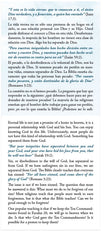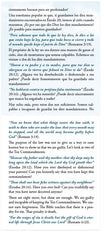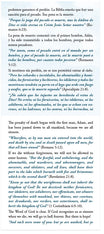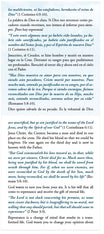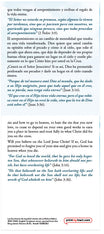Are You Going to Heaven (Bilingual, KJV)
Special-Order Folded Flyer Tract
 NOTE: This item is custom-printed to order (click for more details).
NOTE: This item is custom-printed to order (click for more details).
This tract is from our print-on-demand library, and is not kept in stock. Select the options below, and we will custom-print a batch just for you. Because this item is custom-printed, you can add your custom imprint to the back page at no extra cost.
- Estimated shipping date: Monday, January 12 (Click for more details)
- SKU:
- Discounts: Discount coupons do not apply to this item
- Format: Folded Flyer Tract
- Size: 3.66 inches x 8.5 inches
- Pages: 6
- Imprinting: Available with 5 lines of custom text
- Version: KJV
- Returns: Because this item is custom-printed to order, it cannot be returned.
Show all item details
The full text of this flyer tract is shown below in the KJV version. (Do you want to print this tract in a different version than the one listed? Contact us and let us know what you're looking for—we may be able to create the alternate version for you at no charge.)
If you were to die today, do you know for sure that you would go to heaven? Do you have some doubts about it? The Bible says that you can be sure that heaven will someday be your eternal home!
“These things have I written unto you that believe on the name of the Son of God; that ye may know that ye have eternal life, and that ye may believe on the name of the Son of God” (1 John 5:13).
You can know that you have eternal life. But what is eternal life?
“And this is life eternal, that they might know thee the only true God, and Jesus Christ, whom thou hast sent” (John 17:3).
Eternal life is not just a promise of a home in heaven, it is a personal relationship with God and his Son. You can enjoy knowing God in this life. Unfortunately, most people do not have this kind of relationship with God. Something has separated them from God.
“But your iniquities have separated between you and your God, and your sins have hid his face from you, that he will not hear” (Isaiah 59:2).
Sin, or disobedience to the will of God, has separated us from God. If we have unforgiven sin in our lives, we are separated from God. The Bible clearly teaches that everyone has sinned: “For all have sinned, and come short of the glory of God” (Romans 3:23).
The issue is not if we have sinned. The question that must be answered is this: What must we do to be forgiven of our sins? Most religions teach that people must work to earn forgiveness, but is that what the Bible teaches? Can we be good enough to be forgiven?
One popular teaching is that if we keep the Ten Commandments found in Exodus 20, we will go to heaven when we die. Is that why God gave the Ten Commandments? Is it possible for a person to keep them?
“Now we know that what things soever the law saith, it saith to them who are under the law: that every mouth may be stopped, and all the world may become guilty before God” (Romans 3:19).
The purpose of the law was not to give us a way to earn heaven but to show us that we are guilty. Let’s look at two of the Ten Commandments.
“Honour thy father and thy mother: that thy days may be long upon the land which the Lord thy God giveth thee” (Exodus 20:12). Have you ever disobeyed or dishonored your parents? Can you honestly say that you have kept this commandment?
“Thou shalt not bear false witness against thy neighbour” (Exodus 20:16). Have you ever lied? Can you truthfully say that you have never deceived anyone?
There are eight more, but these are enough. We are guilty and incapable of keeping the Ten Commandments. We cannot earn forgiveness. The Bible teaches that there is a penalty for sin. That penalty is death.
“For the wages of sin is death; but the gift of God is eternal life through Jesus Christ our Lord” (Romans 6:23).
The penalty of death began with the first man, Adam, and has been passed down to all mankind, because we are all sinners.
“Wherefore, as by one man sin entered into the world, and death by sin; and so death passed upon all men, for that all have sinned” (Romans 5:12).
If we die without forgiveness, we will not be allowed to enter heaven. “But the fearful, and unbelieving, and the abominable, and murderers, and whoremongers, and sorcerers, and idolaters, and all liars, shall have their part in the lake which burneth with fire and brimstone: which is the second death” (Revelation 21:8).
“Know ye not that the unrighteous shall not inherit the kingdom of God? Be not deceived: neither fornicators, nor idolaters, nor adulterers, nor effeminate, nor abusers of themselves with mankind, nor thieves, nor covetous, nor drunkards, nor revilers, nor extortioners, shall inherit the kingdom of God” (1 Corinthians 6:9-10).
The Word of God is clear. If God recognizes us as sinners when we die, we will go to hell forever. But there is hope!
“And such were some of you: but ye are washed, but ye are sanctified, but ye are justified in the name of the Lord Jesus, and by the Spirit of our God” (1 Corinthians 6:11).
Jesus Christ, the Creator, became a man and died in our place on the cross. He shed his blood so that we could be forgiven. He rose again on the third day and is now in heaven with the Father.
“But God commendeth his love toward us, in that, while we were yet sinners, Christ died for us. Much more then, being now justified by his blood, we shall be saved from wrath through him. For if, when we were enemies, we were reconciled to God by the death of his Son, much more, being reconciled, we shall be saved by his life” (Romans 5:8-10).
God wants to save you from your sin. It is his will that all come to repentance and receive the gift of eternal life.
“The Lord is not slack concerning his promise, as some men count slackness; but is longsuffering to us-ward, not willing that any should perish, but that all should come to repentance” (2 Peter 3:9).
Repentance is a change of mind that results in a transformed life. God wants you to change your opinion about sin and how to go to heaven, to hate the sin that you now love, to cease to depend on your own good works to earn you a place in heaven and trust fully in what Christ did for you on the cross.
Will you believe on the Lord Jesus Christ? If so, God has promised to forgive you of your sins and give you a home in heaven when you die.
“For God so loved the world, that he gave his only begotten Son, that whosoever believeth in him should not perish, but have everlasting life” (John 3:16).
“He that believeth on the Son hath everlasting life: and he that believeth not the Son shall not see life; but the wrath of God abideth on him” (John 3:36).
Si muriera hoy, ¿sabe con certeza que iría al cielo? ¿Tiene alguna duda al respecto? ¡La Biblia dice que usted puede estar seguro de que el cielo será algún día su hogar eterno!
“Estas cosas os he escrito a vosotros que creéis en el nombre del Hijo de Dios, para que sepáis que tenéis vida eterna, y para que creáis en el nombre del Hijo de Dios”
(1 Juan 5:13).
Usted puede saber que tiene vida eterna. Pero ¿qué es la vida eterna?
“Y esta es la vida eterna: que te conozcan a ti, el único Dios verdadero, y a Jesucristo, a quien has enviado” (Juan 17:3).
La vida eterna no es sólo una promesa de un hogar en el cielo, es una relación personal con Dios y su Hijo. Usted puede disfrutar el conocer a Dios en esta vida. Desafortunadamente, la mayoría de los hombres no tienen esta clase de relación con Dios. Algo los ha separado de Dios.
“Pero vuestras iniquidades han hecho división entre vosotros y vuestro Dios, y vuestros pecados han hecho ocultar de vosotros su rostro para no oír” (Isaías 59:2).
El pecado, o la desobediencia a la voluntad de Dios, nos ha separado de Dios. Si tenemos pecado sin perdón en nuestras vidas, estamos separados de Dios. La Biblia enseña claramente que todas las personas han pecado: “Por cuanto todos pecaron, y están destituidos de la gloria de Dios” (Romanos 3:23).
La cuestión no es si hemos pecado. La pregunta que hay que responder es la siguiente: ¿qué debemos hacer para ser perdonados de nuestros pecados? La mayoría de las religiones enseñan que el hombre debe trabajar para ganar ese perdón, pero ¿es eso lo que enseña la Biblia? ¿Podemos ser lo suficientemente buenos para ser perdonados?
Una enseñanza popular es que, si guardamos los diez mandamientos encontrados en Éxodo 20, iremos al cielo cuando muramos. ¿Es por eso que dio Dios los diez mandamientos? ¿Es posible para nosotros guardarlos?
“Pero sabemos que todo lo que la ley dice, lo dice a los que están bajo la ley, para que toda boca se cierre y todo el mundo quede bajo el juicio de Dios” (Romanos 3:19).
El propósito de la ley no era darnos una manera de ganar el cielo, sino de mostrarnos que somos culpables. Echemos un vistazo a dos de los diez mandamientos.
“Honra a tu padre y a tu madre, para que tus días se alarguen en la tierra que Jehová tu Dios te da” (Éxodo 20:12). ¿Alguna vez ha desobedecido o deshonrado a sus padres? ¿Puede decir honestamente que ha guardado este mandamiento?
“No hablarás contra tu prójimo falso testimonio” (Éxodo 20:16). ¿Alguna vez ha mentido? ¿Puede decir sinceramente que nunca ha engañado a nadie?
Hay ocho más, pero estos dos son suficientes. Somos culpables e incapaces de guardar los diez mandamientos. No podemos ganarnos el perdón. La Biblia enseña que hay una sanción para el pecado. Esa pena es la muerte.
“Porque la paga del pecado es muerte, mas la dádiva de Dios es vida eterna en Cristo Jesús Señor nuestro” (Romanos 6:23).
La pena de muerte comenzó con el primer hombre, Adán, y ha sido transmitido a todos los hombres, porque todos somos pecadores.
“Por tanto, como el pecado entró en el mundo por un hombre, y por el pecado la muerte, así la muerte pasó a todos los hombres, por cuanto todos pecaron” (Romanos 5:12).
Si morimos sin perdón, no se nos permitirá entrar al cielo. “Pero los cobardes e incrédulos, los abominables y homicidas, los fornicarios y hechiceros, los idólatras y todos los mentirosos tendrán su parte en el lago que arde con fuego y azufre, que es la muerte segunda” (Apocalipsis 21:8).
“¿No sabéis que los injustos no heredarán el reino de Dios? No erréis; ni los fornicarios, ni los idólatras, ni los adúlteros, ni los afeminados, ni los que se echan con varones, ni los ladrones, ni los avaros, ni los borrachos, ni los maldicientes, ni los estafadores, heredarán el reino de Dios” (1 Corintios 6:9-10).
La palabra de Dios es clara. Si Dios nos reconoce como pecadores cuando morimos, nos iremos al infierno para siempre. ¡Pero hay esperanza!
“Y esto erais algunos; mas ya habéis sido lavados, ya habéis sido santificados, ya habéis sido justificados en el nombre del Señor Jesús, y por el Espíritu de nuestro Dios” (1 Corintios 6:11).
Jesucristo, el Creador, se hizo hombre y murió en nuestro lugar en la Cruz. Derramó su sangre para que pudiéramos ser perdonados. Resucitó al tercer día y ahora está en el cielo con el Padre.
“Mas Dios muestra su amor para con nosotros, en que siendo aún pecadores, Cristo murió por nosotros. Pues mucho más, estando ya justificados en su sangre, por él seremos salvos de la ira. Porque si siendo enemigos, fuimos reconciliados con Dios por la muerte de su Hijo, mucho más, estando reconciliados, seremos salvos por su vida” (Romanos 5:8-10).
Dios quiere salvarle de su pecado. Es la voluntad de Dios que todos vengan al arrepentimiento y reciban el regalo de la vida eterna.
“El Señor no retarda su promesa, según algunos la tienen por tardanza, sino que es paciente para con nosotros, no queriendo que ninguno perezca, sino que todos procedan al arrepentimiento” (2 Pedro 3:9).
El arrepentimiento es un cambio de mentalidad que resulta en una vida transformada. Dios quiere que usted cambie su opinión sobre el pecado y cómo ir al cielo, que odie el pecado que ahora ama, que deje de depender de sus propias buenas obras para ganarse un lugar en el cielo y confie plenamente en lo que Cristo hizo por usted en la Cruz.
¿Creerá en el Señor Jesucristo? Si es así, Dios ha prometido perdonarle sus pecados y darle un hogar en el cielo cuando muera.
“Porque de tal manera amó Dios al mundo, que ha dado a su Hijo unigénito, para que todo aquel que en él cree, no se pierda, mas tenga vida eterna” (Juan 3:16).
“El que cree en el Hijo tiene vida eterna; pero el que rehúsa creer en el Hijo no verá la vida, sino que la ira de Dios está sobre él” (Juan 3:36).



